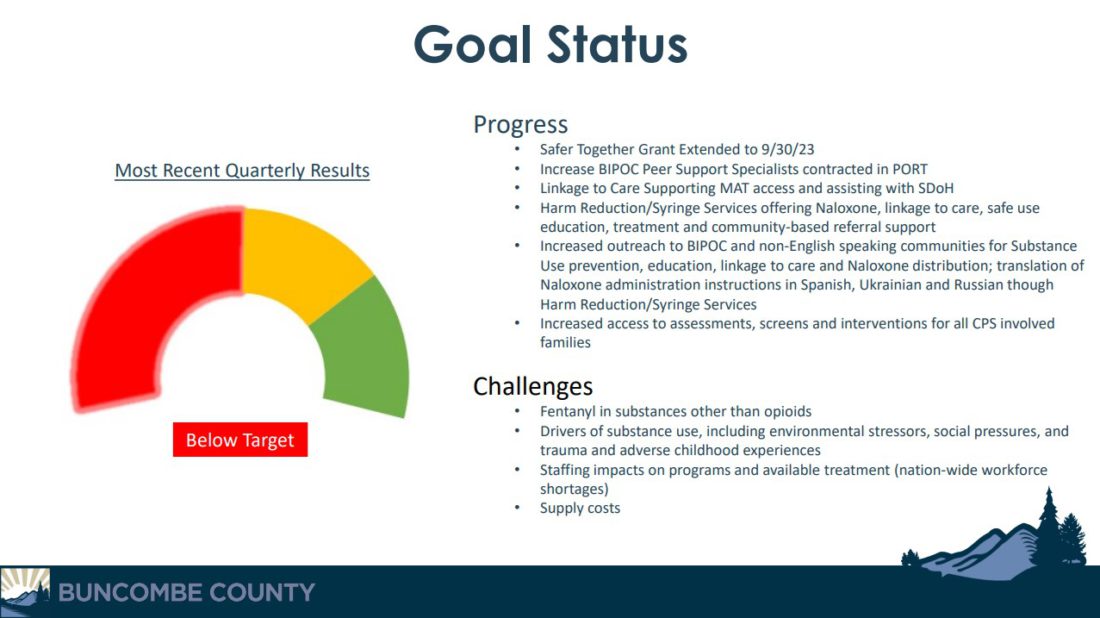Buncombe County is falling short when it comes to resident well-being. A quarterly update on the county’s strategic plan, shared with the Board of Commissioners during a Dec. 5 briefing, showed that three of the plan’s four primary goals in that area are not on track with county targets.
Progress is lacking on increasing public transportation use, expanding recreational assets and eliminating substance abuse deaths. (Buncombe is meeting its targets for enhancing public safety and reducing the jail population.) For the first two of those goals, explained county staffers, the lingering impacts of the COVID-19 pandemic — staffing issues, rising costs and shifting travel patterns — have hampered work.
With substance abuse deaths, the problem is more complex. Despite grant funding and increased support programs, Buncombe saw more such deaths in 2021 than in 2020, when the strategic plan was adopted.
According to Stoney Blevins, head of Buncombe County Health and Human Services, the county served over 2,100 people through its syringe exchange program this year, recorded 450 overdose reversals through its naloxone program and has seen measurable success in keeping families together as parents go through recovery programs. Despite that progress, he acknowledged, 118 residents died of drug overdoses in 2021.
“The challenge is that the game changed,” said Blevins. “We’re playing a lot better, but the foe got bigger. So, while we’re doing good, we are still not accomplishing our goal.”
Blevins cited fentanyl as the biggest factor in the increasing deaths, noting that the potent synthetic drug is now showing up in substances other than opioids. He said the county has also seen an increase in alcohol abuse and suicidal ideation across society as people recover from the pandemic.
Commissioner Jasmine Beach-Ferrara asked whether increasing county funding could help move the needle on reducing substance abuse deaths. “Or is it staff’s sense that these are truly complex problems where the county is just one actor among many — we are doing really innovative interventions, but we are just not able to keep pace?” she continued.
Rafael Baptista, Buncombe’s performance management director, said there was truth to both answers. Some of the county’s challenges would remain no matter how well-resourced the program was, he said, but the board had boosted much-needed funds in some areas that were historically lacking.
Baptista was hopeful that, as work proceeds, the county would see more movement toward its goals. On substance abuse, he added, “I’m not sure. That’s a really challenging one.”
Commissioners consider additional renter protections
An analysis of fair housing in Buncombe County opened a discussion about protecting tenants from discrimination based on their use of housing vouchers.
Fair housing rights in the county, which are meant to ensure all people have equal access to the housing of their choice, are currently based on seven federally protected classes: race, color, national origin, religion, sex, family status and disability. One of several recommendations made by the Land of Sky Regional Council would add source of income and previous eviction history to that list of protected classes.
Mary Roderick, a regional planner with Land of Sky, said Buncombe was among the top three counties in the state in terms of fair housing complaints per capita, according to data gathered by the nonprofit Legal Aid of North Carolina. From 2000-19, the county recorded a total of 87.3 complaints per 100,000 people, compared with a state average of 37.9 complaints per 100,000.
The city of Charlotte, Roderick continued, recently adopted a policy for developments receiving public subsidies that prevents those developments from refusing tenants based on their use of housing choice vouchers or other rental assistance. The Human Relations Commission of Asheville has developed a similar recommendation for the city, although it has not been taken up by City Council for consideration.
“There might be many reasons why people chose not to do it,” said board Chair Brownie Newman, about adding renter protections based on source of income. “It’s not all nefarious. It is a complex bureaucracy the way we create a lot of stuff in our country, especially around affordable housing.”
“It’s not a straightforward or simple thing,” agreed Roderick. “But it is worth looking at.”



Removing income source and eviction record would gut property owner’s right to screen tenants for deadbeats. Those who have romantic notions of poor people have never been landlords.